Part 2
FAITHFUL LIVING – Monday, Tuesday, Wednesday
Another way of thinking about Dwelling in the Psalms is to visualize our movement through the physical structure of the church. (And here I am utilizing the very traditional floor plan of a medieval, Western cathedral or monastery chapel, an architecture that is still to be found in many smaller churches built prior to say about the 1960’s.)
We enter the church from the out-of-doors, remembering our ancient movement from the Garden and the glories of creation. We climb the steps to enter the Narthex, responding to the call of God. We then come to the Baptistry, remembering our deliverance from captivity, and our initiation into the Body of Christ. Then we come to the Nave, where most of us spend most of our worshiping lives, hearing again and again the stories of salvation history, and learning what it means to come into covenant with God, and to follow His Law, and become His Holy People. From the Pulpit and Lectern, we learn the meaning of faithful discipleship, as we learn to follow the Commandments, and live the Beatitudes. In so doing, we encounter our passions, and through purification and repentance, transform them from vices into virtues, and grow in faith, patience and charity.
In summary, then:
Faithful Living comprises the foundational phase of the Soul’s life in God. It begins with creation itself, and with the call to God’s people to follow, love, and obey him.
Faithful Living concerns our deliverance out of captivity—the Israelites’ Exodus from Egypt through the Red Sea, and the Christians’ initiation into the Body of Christ through Baptism and Chrismation.
Faithful Living calls us into Covenant with God, into the relationship of obedience, and surrender to God, who in turn, protects and guides us to the fulfilling His Law, and to becoming His holy people.
Faithful Living above all teaches us to “Love one another.”—to live with compassion for all, even ourselves; to grow in faith, patience, and charity.
Faithful Living continually calls us to repentance and conversion, and to the grateful reception of God’s loving mercy to us, and to all who “fall short of the Glory of God”—which, of course, is all of us.
Faithful Living transforms our vices into virtues, and, through detachment and discrimination, we become more dispassionate—no longer at the mercy of our own passions.
MONDAY
| FAITHFUL LIVING Creation / Salvation History | |||||
|---|---|---|---|---|---|
| MONDAY | WEEK 1 | WEEK 2 | WEEK 3 | WEEK 4 | |
| Matins | 135 | 68 | 81 | 8 | |
| 33 | 24 | 44 | 76 | ||
| 136 | |||||
| MONDAY | WEEK 1 | WEEK 2 | WEEK 3 | WEEK 4 | |
| Vespers | 105, Part I | 106, Part I | 78, Part I | 78, Part II | |
| 105, Part II | 106, Part II | 100 | 114 | ||
TUESDAY
| FAITHFUL LIVING Discipleship / Passions | ||||||
|---|---|---|---|---|---|---|
| TUESDAY | WEEK 1 | WEEK 2 | WEEK 3 | WEEK 4 | ||
| Matins | 119:1-16 | 119:49-64 | 119:97-112 | 119:145-160 | ||
| 119:17-32 | 119:65-80 | 119:113-128 | 119:161-176 | |||
| 52 | 36 | 58 | 21 | |||
| 70 | ||||||
| TUESDAY | WEEK 1 | WEEK 2 | WEEK 3 | WEEK 4 | ||
| Vespers | 119:33-48 | 119:81-96 | 119:129-144 | 17 | ||
| 14 | 10 | 53 | 40 | |||
| 7 | 4 | 39 | 144 | |||
| 120 | 3 | |||||
WEDNESDAY
| FAITHFUL LIVING Purification and Repentance | ||||
|---|---|---|---|---|
| WEDNESDAY | WEEK 1 | WEEK 2 | WEEK 3 | WEEK 4 |
| Matins | 80 | 26 | 83 | 108 |
| 60 | 38 | 102 | 109 | |
| 56 | 13 | |||
| 142 | ||||
| WEDNESDAY | WEEK 1 | WEEK 2 | WEEK 3 | WEEK 4 |
| Vespers | 69 | 6 | 42 | 5 |
| 54 | 74 | 43 | 137 | |
| 32 | 59 | 141 | ||
| 57 | ||||
Dwelling in the Psalms, Part 1
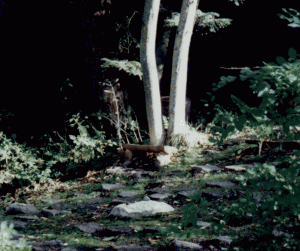
29 July 2013
Feast of Mary and Martha of Bethany
Dwelling in the Psalms
Part 1
INTRODUCTION
The Book of Common Prayer introduces the Psalter by saying “it is a body of liturgical poetry, designed for vocal, congregational use, whether by singing or reading.” And in the Anglican tradition, there has long been an expectation that clergy would say the daily offices of Morning and Evening Prayer, and that this discipline would also be followed by devout laity as much as possible. Yet I think if we are candid, it is a discipline that is likely practiced only by a minority, whether lay or clerical. I can only confess that, having once known the riches of the monastic community praying and chanting the prayers and psalms day after day, season after season, I frankly found it nigh on impossible to say the offices on my own. They were designed for corporate, congregational prayer, and that was no longer an option for me on a daily basis.
Yet always, my heart hungered for what I knew was truly food for the soul. And so after years—nay, decades!—of praying in an unstructured, irregular manner, I found myself returning once again to a more traditional practice. Perhaps my own interior silence had deepened sufficiently to sustain a richer feast of psalms, readings, and canticles.
As a result, this arrangement of the Psalms is the fruit of an effort to find a way of praying the Psalms that is in accordance with the practice of the ancient Church, and that is also coherent with the life-style of the solitary anchorite or hermit. (Perhaps it may also be useful for others who pray alone, or even in community.)
Praying the Psalms in solitude is very different than praying them in a congregation or a monastic community. In solitude, one does not have the support of other voices, other souls—except, of course, for the presence of the Communion of Saints, who are even now and unto the ages lifting their voices in praise to the Holy Trinity.
The life of a vowed anchorite or hermit is also a life dedicated to silence and simplicity. As such, the traditional breviaries and lectionaries may be found cumbersome, and unduly complicated, often impinging upon the deep silence of contemplative prayer.
This arrangement, then, is significantly simplified. The cycle of Psalms is spread over a four-week cycle. In addition, rather than the ancient tradition of seven daily offices, and the more contemporary tradition of four offices a day, this Psalter is divided between Matins and Vespers. Some may choose to add a period of intercession at noon day, and the traditional late-evening office of Compline may more easily be recited by memory while preparing for sleep.
A few comments about the distribution:
For generations, lectionaries have distributed the scripture readings to reflect to some extent the season of the liturgy (Advent, Christmas, Epiphany, Lent, Easter….and less so for “ordinary time”). Yet I have been unable to find any tradition (Orthodox, Roman Catholic, Anglican) that does the same to a significant degree with the Psalms. By and large, the Psalms most often seem to have been prayed in a roughly numerical order, whether on a weekly, bi-weekly, or monthly cycle, with occasional variations to be found. If anyone knows of other types of ‘thematic’ lectionaries for the psalms, I hope you will let me know!
The only thing I have found which is close to a thematic (non-seasonal) distribution was that developed by Bonnell Spencer, OHC, in A Monastic Breviary, used by the Order of the Holy Cross and the Order of St. Helena. Fr. Spencer introduced the Psalter by saying,
In determining the assignment of [the psalms], the effort was made, not only to fit them to the time of day, but also to give certain days of the week a special tone. Thus worship and thanksgiving characterize the psalms selected for Sunday, and also for Thursday because of its association with the Eucharist and the Ascension. Friday, and to a lesser extent Wednesday, have been treated as penitential. The Incarnation and the part taken in it by the Virgin Mother are associated with Saturday. A Monastic Breviary (Holy Cross Publications, 1976)
However, the more I have immersed myself in the ancient patristic tradition of ascetical practice, and discovered therein a clear path for the journey of the soul, I found the traditional psalm distribution to be jarring and seemingly without any reflection of this spiritual path. So at last, building on these studies, I began to examine the traditional stages of the mystical path as a context for praying the Psalms.
In the Western Church, we have traditionally identified three stages: Purification (or Purgation); Illumination; and Union. These designations found their roots in the teaching of the early church (3rd-7th centuries), especially in such masters of the life of the soul as Gregory of Nyssa, Evagrius of Ponticus, Dionysius the Areopagite, and Maximus the Confessor. They identified similar stages, but more often used terms such as the Practical Life, Contemplation, and Theosis (or Divinization). Further, contemplation was often seen as having two stages within it, the earliest being contemplation of the created order, and the more advanced being contemplation of the ‘intelligibles’ or the ‘Heavenly Jerusalem.’ Only after passing through these stages, would the soul come to the fullness of the ‘likeness’ of God, or theosis, or union.
I have adapted these stages under the headings of “Faithful Living”, “Contemplative Living”, and “Holy Dwelling.” While using this understanding of the mystical path, rather than simply reciting the psalms in numbered sequence, I have arranged them—to the degree possible—to reflect the journey of the soul through the stages according to various themes reflecting the experiences and emphases of each stage.
Psalm Stages & Themes
| WEEKDAY | STAGES | THEMES |
|---|---|---|
| SUNDAY | Holy Dwelling | Resurrection / Theosis |
| MONDAY | Faithful Living | Creation / Salvation History |
| TUESDAY | Faithful Living | Passions / Discipleship |
| WEDNESDAY | Faithful Living | Purification / Repentance |
| THURSDAY | Contemplative Living | Illumination / Wisdom |
| FRIDAY | Contemplative Living | Sacrifice / Redemption |
| SATURDAY | Holy Dwelling | Incarnation / Virtue |
Such a distribution of the Psalms supports the soul by each week emphasizing the different stages of the mystical journey. Of course, not every psalm fits neatly into these categories, and someone else might determine a very different distribution. I was also constrained by an effort to approximate the number of verses for each office, coming up with an overall average of 44 verses for each of the 56 offices in a four-week cycle.
Although traditional practice is to begin each week with Saturday Vespers, I have chosen to use our more modern calendar by beginning with Sunday. However, it would be simple to adjust this system to the more traditional, simply by moving Saturday Vespers to the beginning of each week.
What about the ‘imprecatory’ verses? Our modern sensibility finds them very objectionable, indeed. Some lectionaries omit them entirely. And yet, does that not simply impose our own sensibilities upon what has for millennia been part of the prayer of faithful people, Jew and Christian alike? As hard as some of these verses are to pray, it seems to me they must be retained. We may not wish to think of ‘dashing little ones’ heads against the rocks’ (Ps. 137), but there are people out there who do just that, and perhaps our prayer can bring them—and our own unruly passions—into the transforming presence of God. It is also worth noting that the ancient tradition was to see some of these verses as directed against the assault of demonic and evil forces, a reality which must be encountered by any soul who prays for very long.
One other note: Psalm 95 is not included here because it is used every day at the beginning of Matins. The translation used is that of the 1979 Book of Common Prayer.
In the coming days, I will continue these posts on the psalms, with a slightly fuller explanation of each stage, and with a chart of the psalms assigned to each office and day within each stage.
Susan Creighton+
Dwelling in the Psalms, Part 2
Dwelling in the Psalms, Part 3
Dwelling in the Psalms, Part 4
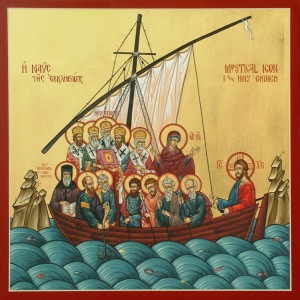
Mystical Icon of the Holy Church by the hand of Matthew Garrett, 2008 http://holy-icons.com/
In this season of ecclesiastical upheaval and discontent, it seems useful to remember that, sadly, thus it has ever been down through the centuries. It is even more important to remember that though the Church may sail through treacherous seas, Christ is always at the helm.
My prayers for the Church this morning led to those of St. Isaac of Nineveh (also known as St. Isaac the Syrian) from the 7th Century:
O Mystery exalted beyond every word
and beyond silence,
who became human in order to renew us
by means of voluntary union with the flesh,
reveal to me the path
by which I may be raised up to your mysteries
. . .
Gather my mind into the silence of prayer
. . .
Stir up within me
the vision of your mysteries
so that I may become aware of what was placed in my
at holy baptism.
You made me to be light and salt for the world:
may I not prove a stumbling block for my companions.
Prayers of Isaac of Nineveh, 7th C.
Translated by Sebastian Brock
Lord, overshadow your holy Church which has been redeemed by your blood; cause to dwell in it your true peace which you gave to your holy apostles; bind her children in holy bonds of indissoluble love; may the rebel not have power over her, and keep far from her persecution, tumult, and wars, both from those within and from those without; and may kings and priests be bound together in great peace and love, their minds always filled with gazing towards you, and may the holy faith be a wall for your flock.
A prayer of Isaac of Nineveh, 7th C.
Translated by Hilarion Alfeyev
Almighty an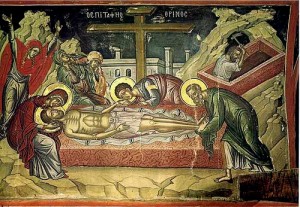 d everlasting God, by whose Spirit the whole
d everlasting God, by whose Spirit the whole
body of your faithful people is governed and sanctified:
Receive our supplications and prayers which we offer before
you for all members of your holy Church, that in their
vocation and ministry they may truly and devoutly serve you;
through our Lord and Savior Jesus Christ. Amen.
Almighty God, kindle, we pray, in every heart the true love of
peace, and guide with your wisdom those who take counsel for
the nations of the earth; that in tranquility your dominion may
increase, until the earth is filled with the knowledge of your
love; through Jesus Christ our Lord. Amen.
Gracious God, the comfort of all who sorrow, the strength of
all who suffer: Let the cry of those in misery and need come
to you, that they may find your mercy present with them in all
their afflictions; and give us, we pray, the strength to serve
them for the sake of him who suffered for us, your Son Jesus
Christ our Lord. Amen.
Merciful God, creator of all the peoples of the earth and
lover of souls: Have compassion on all who do not know you
as you are revealed in your Son Jesus Christ; let your Gospel
be preached with grace and power to those who have not
heard it; turn the hearts of those who resist it; and bring
home to your fold those who have gone astray; that there
may be one flock under one shepherd, Jesus Christ our Lord.
Amen.
O God of unchangeable power and eternal light: Look
favorably on your whole Church, that wonderful and sacred
mystery; by the effectual working of your providence, carry
out in tranquility the plan of salvation; let the whole world
see and know that things which were cast down are being
raised up, and things which had grown old are being made
new, and that all things are being brought to their perfection
by him through whom all things were made, your Son Jesus
Christ our Lord; who lives and reigns with you, in the unity
of the Holy Spirit, one God, for ever and ever. Amen.
Lord Jesus Christ, Son of the living God, we pray you to set
your passion, cross, and death between your judgment and
our souls, now and in the hour of our death. Give mercy and
grace to the living; pardon and rest to the dead; to your holy
Church peace and concord; and to us sinners everlasting life
and glory; for with the Father and the Holy Spirit you live
and reign, one God, now and for ever. Amen.
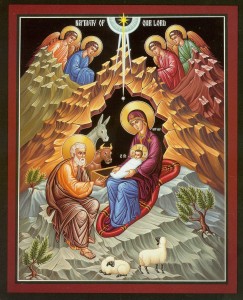
Adorn yourself, O cavern!
Make ready, O manger!
O shepherds and wise men,
bring your gifts
and bear witness,
for the Virgin is coming,
bearing Christ in her womb!
Vespers Hymn of St Nicholas Day
Advent, 2011
For millenia past counting, humanity has experienced both a fascination and a dread of caverns and caves. Caverns can be awesome and beautiful; caves may be narrow and constricting, or broad and expansive. Our earliest ancestors found shelter within them, and a place of defense against weather, wild animals, and human foes. Other ancestors entered caverns for shamanic rituals, and painted their walls with the creatures who both sustained and frightened them.
In the Holy Scriptures, caves are the hiding places for warriors and prophets. They are also places of revelation—Elijah hears the Voice of God in a cave, and later discovers that the Voice is most truly heard in the silence of the heart. In the Psalms, David finds caves to be a place of prayer, penitence, and forgiveness. Even the Arc of the Covenant and the altar of incense, in flight from the destruction of the first temple, find refuge in a cave. And over and over, from Abraham to Judith to Lazarus, caves are the place of burial, symbolizing the words we hear at our own burial: “Remember that thou art dust, and to dust thou shall return.”
Is it any wonder, then, that the early Christians identified the place of our Lord Jesus Christ’s birth as a cave? Truly, it was a refuge from the perils of travel, and the crowds filling the streets of Bethlehem. This humble cavern sheltered the prayers of Mary and Joseph, shone with the adoration of shepherds, received the Magi and their gifts, and rang out with the angels’ songs of great joy.
Assuredly, this lowly cave became the Holy Dwelling of revelation—the revelation that God has come among us, clothed in human flesh; it is also a foreshadowing of Jesus’ return to a cave for His own burial, the same cave that would bear witness to His Resurrection.
May this season of Christ’s birth remind us all to pray for and serve those who also seek refuge in the night, protection from all danger, and a Holy Dwelling—be it ever so humble—in which they too may receive the gift of God’s love, and learn to sing with the angels.
The Rev’d. Susan Creighton
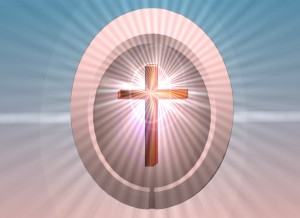
Holiest of Holy
On a sunny, peaceful morning, I awoke about 6:30, and turned on the TV news, expecting a mundane weather report. Stunned, and with a paralyzing sense of doom clutching my heart, I could scarce believe what I was seeing as sirens shrieked, pillars of smoke and fire arose, and the panic-stricken fled first from the World Trade Center Towers, and then from the Pentagon. As the hours went on, with one horrific image following another, I finally threw a blanket over the television. I wanted to know what was happening, but could not bear to see.
Mid-morning, when we were still uncertain exactly what had happened, I went to my altar, to pray the Great Litany, and the Prayers for the Dying; I chanted the Om Jesu Christi, Miserere nobis; I sat in silence, before the reserved Sacrament, and enveloped by the presence of Christ. I let the tears flow. Then, I attempted to draw what could not be put into any form, any color, any words other than those of Lady Julian, “All shall be well; all shall be well, all manner of things shall be well.”
Now, I saw the Cross of Sorrows enter the Mosque—enter the Holiest of Holy, enter the Light of God that knows no name, no creed, no boundary. All is One. There is no Path, there are no Steps. There are no more tears to be shed in sorrow; no more weary, stumbling feet carrying burdens of bloodshed and hatred. All is One.
Susan Creighton+
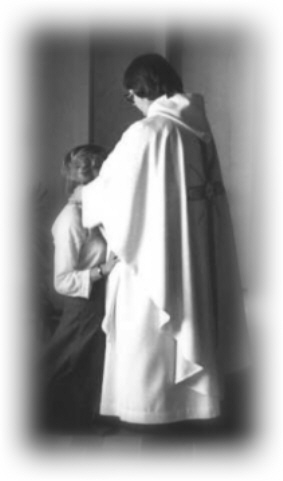
(Thirty years ago–1981–The Feast of the Visitation fell on a Sunday. It was transferred to Monday, June 1st, and on that day I was ordained to the sacred priesthood. This meditation—in the form of a ‘letter’ from Elizabeth to Mary—was given a year later as a sermon in the Convent of St. Helena, Vails Gate, NY. I offer it once again, in thanksgiving to God for the many blessings of being called to stand at His altar and offer the Holy Mysteries.
Please pray for me that I may continue to bear this sacred office faithfully.)
A Meditation on the Feast of the Visitation
My Dear Cousin:
I dictate this letter with faltering voice and with a great sense of weariness, for the years have multiplied upon my head. I am so old now that I’ve forgotten just how many years there have been. But I’m not so old that I’ve forgotten everything. In fact, it seems the events of long ago happened only yesterday, and now as the dusk of my life draws to a close, and the soft darkness of death approaches, I feel moved to share some of these memories with you.
For you see, dear cousin, you were really the only one who fully understood; and of course you were the only one who could—for you, too, were a woman, and a mother—and you, too, have borne a son dear to your heart.
That day long ago when you visited me so unexpectedly is as clear in my memory as the summer sun. Then, as now, we lived high in the hills of Judea, and the air was clear and sharp, yet heavy with the expectation of the late rains and of the harvest soon to be gathered in. It had been a long, cold spring for me, and I had felt all the aches of the ancient in my heavy body; even then, my years were many. And then there was this added burden—so welcome but still so heavy.
My belly grew and my legs ached with the weight of it, and I wondered as my time grew near whether or not my strength would fail me.
My body had never learned in its youth how to be a mother, and these lessons come late were taxing to body and soul. I found a loneliness in it, for my beloved husband was enveloped in a great silence that even my love could not seem to penetrate. He had been like this ever since his last turn of service at the temple in Jerusalem: utterly unable to speak, and with the light in his eyes turned inward as if he gazed upon a sight beyond human vision. I know now that his silence came from God, but then it was a hard thing to know, and I longed so for just a word from him—just a word to tell me that he shared both my pain and my joy. But his silence became my silence, and together we waited.
In all those silent months, I had long hours to pray and think, for my old body refused to labor in other ways. It, too, had turned inward, and all my energies seemed to pour into this new life within me, and to leave little over for outward concerns
. And as I waited and prayed, and grew heavier and heavier, I remembered: I remembered Sarah as she must have been: like me, both joyous and frightened with the advent of a pregnancy so ardently longed for. I remembered her faithfulness, her willingness to follow Abraham to new lands, to uncertain futures, to the eternal seeking of what must have seemed an illusory promise. Sarah knew; she knew what it was to wait, and pray, and remember. She knew what it was to be a mother, to bear a son, to let him go.
Then there was Rachel: won by Jacob after long years of labor; sharing him with her sister Leah. Rachel, too, must have known long years of silence and grief and prayer. And then at last God “hearkened to her and opened her womb” and she bore her son Joseph. Rachel knew: she knew what it was to wait, and pray, and remember; she knew what it was to journey ever forward and follow a God who demanded all; Rachel knew what it was to give that all as she labored over the birth of her son Benjamin, the son who claimed her life as the price of his own.
And so the long months went on, there on the hills of Judea. The days passed, and I waited, and my belly grew. I found it hard to sleep, and often rose long before the dawn to sit in the soft darkness and watch the light slowly creep over the eastern mountains. Those were the moments when I felt utterly at peace; I knew that my beloved had been faithful to God; I knew that the life within me would not die; I knew that the silence and waiting would come to an end.
Those quiet mornings were precious to me, and I felt my own heart sing as the first sleepy birds began the morning chorus. And singing brought to mind that other old friend from the past: Hannah. Like me, Hannah had been long barren, and sorely tormented by her affliction. She, too, had known the scorn of others as the years rolled past. She, too, waited and prayed most fervently, and the Lord heard her prayer and had pity upon her. In due time Hannah conceived, and bore a son, and called his name Samuel, for she said, “I have asked him of the Lord.” Hannah knew what it was to bear a son, and to let him go—to lend him to the Lord’s service; and she knew how to rejoice in her blessing: “My heart exults in the Lord; my strength is exalted in the Lord. There is none holy like the Lord, there is none besides thee; there is no rock like our God … He raised up the poor from the dust; he lifts the needy from the ash heap, to make them sit with princes and inherit a seat of honor. For the pillars of the earth are the Lord’s, and on them he has set the world.”
Hannah knew how to wait, and pray. Hannah knew how to sing.
And so, dear cousin, the months passed. And that clear spring day dawned, and the birds sang, and I went about the chores of my silent house, waiting, ever waiting.
Then you came. You entered my house and greeted my beloved and me, and with the sound of your young, hopeful voice, the child in my own womb leapt for joy.
From the deep pit of silence within me came the cry, “Blessed are you among women, and blessed is the fruit of your womb! … And blessed is she who believed that there would be a fulfillment of what was spoken to her from the Lord.”
And your voice broke into song: “My soul proclaims the greatness of the Lord, my spirit rejoices in God my Savior; for he has looked with favor on his lowly servant.” You sang, O Mary, my cousin, and you brought joy and peace to our silent house. And then you departed upon your own way, already swelling with the child within your own womb, and I waited, larger and heavier, and so near to my own time of delivery.
Yes Mary, we both know what it is to wait, to bear a son, to let him go, to sing.
And in these many years since, we have not ceased learning to wait, to pray, and to sing. Even in those moments of the greatest grief, we have known joy. My own John left us so early; his father’s blessing was upon him, and he went forth to prepare the way of the Lord; he went forth to be the prophet of the Most High … It was hard to let him go, and yet we knew we must, for he was ours no longer; the Spirit had claimed him from time before time, from that moment in the temple when my beloved Zechariah was struck dumb.
But it was hard to let him go: Sarah’s son was spared the knife; my son was not.
Yet still we sang: “Blessed be the Lord, the God of Israel; he has come to his people and set them free.” And you, my dear: you were so very young, yet you bore so very much more. You bore the Son who redeems us all; you bore the pain of scorn and rejection even as he lay in your womb; you bore the abandonment of Golgotha; you bore the incredible news of his resurrection; you bore the sight of his risen body and sore wounds.
You bore all this, my dear Mary, because you are the most favored one: You are she, chosen above all women to be the Mother of God.
You are she, my dear, who has become the mother of us all. Yes, even of me, your old, old cousin. For you are she who has taught us all to wait, to pray, to remember, to sing.
You are she who has taught us to bear forth within our barren bodies the Word of the Lord.
You are she who has taught us to seek the fruit of Christ within the hearts and minds and souls and bodies of all whom we meet.
You are our Mother, calling us forth to give birth to Love.
“Blessed are you among women, and blessed is the fruit of your womb!”
With weary joy, my dear, I remain your affectionate cousin,
+Elizabeth+
AND THE ANGEL SAID:
TO YOU IS BORN THIS DAY
IN THE CITY OF DAVID
A SAVIOR, WHO IS CHRIST THE LORD.
Born in humility,
Becoming our flesh:
Sing, O Angels of Heaven!
Proclaim the birth of Christ!
Mothers will come,
To nourish a babe:
Sing, O Angels of Heaven!
Proclaim the birth of Christ!
Fathers will come,
To shelter the weak:
Sing, O Angels of Heaven!
Proclaim the birth of Christ!
Children will come,
Trusting, unafraid:
Sing, O Angels of Heaven!
Proclaim the birth of Christ!
Shepherds will come,
Knowing his Voice:
Sing, O Angels of Heaven!
Proclaim the birth of Christ!
Royalty will come,
To adore the true King:
Sing, O Angels of Heaven!
Proclaim the birth of Christ!
Servants will come,
To serve at His Throne:
Sing, O Angels of Heaven!
Proclaim the birth of Christ!
Sinners will come,
To weep at His Feet:
Sing, O Angels of Heaven!
Proclaim the birth of Christ!
Mourners will come,
Seeking the Light:
Sing, O Angels of Heaven!
Proclaim the birth of Christ!
Prisoners will come,
Longing for freedom:
Sing, O Angels of Heaven!
Proclaim the birth of Christ!
Priests will come,
To lift bread and wine:
Sing, O Angels of Heaven!
Proclaim the birth of Christ!
Born in humility,
Becoming our flesh:
Sing, O Angels of Heaven!
Proclaim the birth of Christ!
GLORY TO THE FATHER, AND TO THE SON,
AND TO THE HOLY SPIRIT:
AS IT WAS IN THE BEGINNING,
IS NOW AND EVER SHALL BE,
UNTO AGES OF AGES. AMEN.
SC+, 2010
Be Silent All Flesh…the Lord has roused Himself from His Holy Dwelling. (Zechariah 2:13)
Christmas, 2010
In the midst of military, political and economic chaos in all corners of this earth:
…a small businessman in Maine, grateful for his freedom, begins a movement now numbering thousands of volunteers who lay Christmas wreaths on the tombs of fallen soldiers with a moment of silent prayer.
In the midst of crowds thronging the malls and holiday parties, with the gaiety escalating to near-hysteria:
…a woman gathers her courage, and calls for silence when a child is overwhelmed by the noise and unchecked emotions swirling around him.
In the midst of beeping monitors and flashing lights required by a frightening series of medical tests:
…a gentle nurse promises to let a patient sleep in silence through the night.
In the midst of strident voices—left and right—decrying this or that current (and perhaps soon-to-be-forgotten) cultural battle:
…a 7th Century monk prays: “O Mystery exalted beyond silence, gather my mind into the silence of prayer, free from the concerns of this world.”[1]
Yes…Let all flesh be silent. For in these small pockets of silence, all too rare and fleeting, hidden away and often unnoticed—in these precious moments between breaths when we can hear our own hearts beat . . . now is the time to keep silence.
For it is only in such silence that the Holy One can rouse from His Holy Dwelling in the Heart of God, and come among us to be born in a poor stable in Bethlehem. Only in such silence can the Holy One bring strength and courage to the heart of a soldier keeping watch in the mountains of Afghanistan. Only in such silence can the touch of the Holy One comfort the heart of a little child surrounded by poverty, or despair. Only in such silence can the Holy One enter our own hearts, and find once again His own Holy Dwelling.
I do pray we will all find those moments of silence when the Lord enters His Holy Dwelling within our hearts.
Susan Creighton+
[1] Isaac of Ninevah, 7th C. Syria: in The Syriac Fathers on Prayer and the Spiritual Life, translated by Sebastian Brock, (Kalamazoo: Cistercian Publications, 1987)
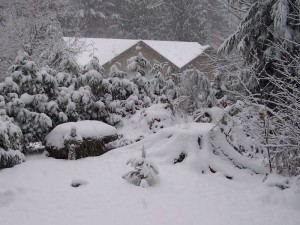
NOTE: I wrote this meditation over thirty years ago…only now am I beginning to understand it.
The Rev’d. Susan Creighton, Anchorite
Winter is an odd time to begin anything: we think of it as the last of the Four Seasons; as a metaphor for the closing years of a long life; as a time of hibernation, stillness, and death. And as we ourselves approach this time of year, or time of life, we may find we would rather hearken back to the newness and hopefulness of Spring, to the exuberance of Summer, to the glorious abundance of Autumn. Ah, those gaudy, golden months of Autumn, when the trees fling themselves into an oblation of color, shouting with all the energy from the summer of their youth: “Glorify the Lord, O mountains and hills, and all that grows upon the earth, praise him and highly exalt him for ever.”
But the day comes when that shout is muted by the gray shawl of low hanging clouds, slipping round the hills, and bringing soft, tentative rain. Slowly, bolstered by a rush of wind, the rain gathers courage, daring to challenge the riot of color. Where once an occasional leaf floated casually to earth, slow and relaxed as a Sunday driver, now a blizzard of gold and red strips the trees of the last vestiges of life. A vast silence permeates the waiting forest, as final preparations are made for the pall of snow that soon will cloak the ugliness of naked death.
Then one morning we wake to an icy moonlight and know that Winter is upon us. The earth lies still and silent, all sounds muted by the cloak of snow, all life seemingly brought to a standstill: the birds do not sing; the woodchucks lie snug in their burrows; the woodland streams are frozen in their beds. And we find that this awesome stillness penetrates into our own hearts: Winter has entered into us, and into our prayer.
For our life of prayer also has seasons: the tentative Spring of newborn faith, just beginning to hope; the full-blown Summer of certainty and conviction, when we dwell in the full radiance of the Light of God. And of course there is the glorious Autumn of prayer, when we reap the harvest of long seasons of spiritual planting and cultivating; when we move beyond petition to praise; beyond penance to the mature knowledge of the love of God.
Then, as inevitably as the seasons of the earth, comes a time of Winter to our life of prayer, our life in God. Sometimes this spiritual Winter slips upon us almost unnoticed, like the slow shortening of the hours of daylight. Or, it may come to our prayer like the furious gust of a late hurricane, tearing from us all certainty, all fruitfulness, and battering us into a depression and bleakness than can be likened only to death. But whether our Winter comes slowly and unnoticed, or furiously and devastatingly, we at last find ourselves in a place of immense stillness.
The Winter of prayer is a place of grayness, yet with the stark contrasts of icy blackness and brilliant whiteness. Just as the bare skeletons of the trees stand silhouetted against dull gray sky, we find our prayer has become naked and stripped and skeletal. We find no green hope of life in our prayer, let alone any evidence of fruit or mature foliage. We cannot pray, and so we simply say prayers, depending upon the bare bones of the faith of the Church, and the promise of the sacraments to carry us through the death of our own prayer.
Then, slowly, as the Winter wears on, we begin to find comfort in its very stillness, and shelter in the blanket of snow which has brought rest and silence to our prayer. We find that in the silence of this spiritual Winter, we are listening more acutely to the voice of God. And while we feel ourselves frozen into the stillness of Winter, we yet find the Water of Life flowing deep within us, and deep within the bosom of the earth.
As we move more deeply into this Winter, we find that the place of stillness and death has been transformed into one of waiting and rest. As the trees must shed their leaves and draw back their sap to prepare for another season of life and growth, so, too, we must allow our prayer such a Winter. For Winter does not mean that life has departed from the earth, nor has faith departed from our prayer. Rather, it is a time of waiting, and rest, and even of death, in which we pause and prepare for the rebirth of Spring, the renewal and greater growth of the next season of prayer. Winter, as the culmination of the year, and the completion of a life span, is also the beginning of a new cycle of seasons, the beginning of New Life in Christ. Winter brings a time of deep silence to our souls, a silence out of which we can proclaim, “Glorify the Lord, O chill and cold, drops of dew and flakes of snow. Frost and cold, ice and sleet, glorify the Lord, praise him and highly exalt him for ever.”